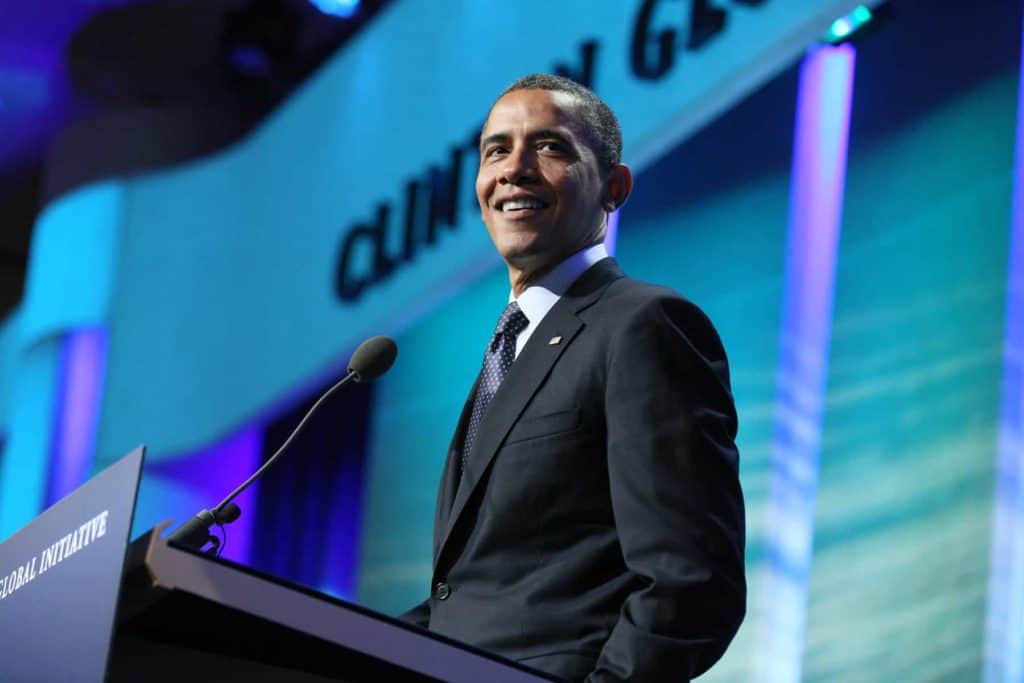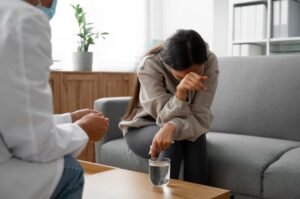Addiction has long been a taboo subject. The words “alcoholic” and “addict” held a stigma and an element of shame. Having an addict in your family meant holding a dirty little secret, but today the stigma is beginning to lift. Many in recovery are beginning to speak out in an effort to spread hope. As we face an opiate epidemic, there are many out there who need to hear that they can get better, that they can beat their addiction. And the government is beginning to speak up as well. On Wednesday, October 21, 2015, President Barack Obama spoke at a community forum at the East End Family Resource Center in Charleston, W. Va. Our president addressed today’s opiate epidemic as he announced new steps to combat heroin and prescription drug abuse. This announcement was part of a broader plan to battle opiate addiction. He spoke of expanding the training that doctors receive regarding prescribing opiate painkillers. He spoke of the pain that addiction causes to those close to an addict. And he spoke of his own daughters, stating, “There but for the grace of God go I,” after a mother’s emotional telling of her experience as the parent of an addict.
For many of us in recovery, it is a comfort to see addiction receive national attention. One such young man in West Virginia was surprised by a call from the White House days before the event, and he was asked to introduce the President. Jordan Coughlen is a gentle soul and someone I am proud to call friend, so imagine my surprise when I tuned in to hear Obama’s speech, and there was Jordan introducing the President of the United States. He bravely took to the podium to share his experience, strength, and hope with poise and dignity. I watched as a friend of mine in recovery stepped up to participate in the recovery moment. It warmed my heart, inspired me, and filled me with hope for those who still suffer today. I was blown away by his courage and vulnerability, so I asked Jordan a few questions about this incredible opportunity and his thoughts on Obama’s plan to fight opiate addiction. You can also watch Jordan’s introduction followed by Obama’s speech on the subject below.
NORTHBOUND: What an amazing honor! What went through your head when you were asked to introduce The President of the United States?
JORDAN: Complete and utter shock! I was asked to introduce him the afternoon before he came in, so between rushing to write the speech, driving down to Charleston, and practicing a few times in my hotel room, it felt like an out of body experience. Initially, when the White House first called, I was just hoping to get a seat at the event. As the Peer Recovery Specialist for Youth Services System Inc., a non-profit agency that serves the vulnerable and at-risk youth in the Northern Panhandle of West Virginia, I felt that being there would be an amazing opportunity to gain information and insight on this epidemic sweeping this great state. I also wanted to serve as an advocate for my clients and all the residents of my newly adopted home. While interviewing me for a seat, I was asked some personal questions about my position, as well as my passion and experience with the topic at hand. I never thought that my honest and heartfelt answers would get me an invitation to introduce the man himself! I was speechless when the White House asked me, but it was something I couldn’t pass up. To say that I am honored is an understatement. What an incredible forum to be of service.
NB: What do you think the impact of Obama’s efforts to fight addiction will be?
J: Obama came to address the opiate epidemic in West Virginia, and to enact two new policies that will change the way opiate misuse is addressed across the nation. His administration is taking this issue very seriously, and I have already begun to see changes across the state of West Virginia as well as across the nation. I recognize that progress tends to be slow and steady, but the fact that this issue is being talked about, that stigma is being reduced, and new and alternative pathways are being studied and discussed is absolutely wonderful.
NB: How long have you been in recovery? Could you have imagined that this experience would have been part of your journey?
J: Recovery is a highly personal experience, and is most definitely not “one size fits all.” I have come to recognize that there are multiple pathways and that each one needs to be treated with the same dignity and respect as the next. Substance abuse does not discriminate, and recovery shouldn’t either. That being said, I have been free from active opiate misuse for over 23 months. After graduation from college I had a major relapse with my drug of choice but I have been in recovery for far longer than that. I have heard it said that the opposite of addiction isn’t recovery, its connection. I see how being distanced from my supportive social network sparked my relapse. That realization is part of what drew me back to this area of the country. I never thought that following my heart and moving back to this area, in spite of what some people thought, would have led me to this job, which got me connected to the White House, and eventually the opportunity of introducing the President with a snapshot of my recovery story.
NB: There is a movement right now questioning the relevancy of anonymity in today’s world. What are your thoughts on that debate?
J: I think that anonymity is a beautiful and wonderful principal, but that it can be taken to an extreme. I felt for the longest time that I needed to keep my struggle with opiates a secret, essentially stigmatizing myself. I also found that using words that are traditionally used like “addict,” went to further stigmatize me and limit me in the minds of others, as well as myself. That is why I prefer more recovery positive terminology, like “person in long-term recovery.” I also like listing what that means to me, like being a son, a homeowner, a friend, and an avid traveler. Not only does it keep it in a positive light, but it keeps recovery universal and inclusive, opening it up to all people, all recovery pathways, and all the many things that one can be in recovery from. I told my story on an international level, and the outpouring of love and support I received from people was beyond my wildest dreams. I only received that because I mustered up the courage to share my story, and not remain anonymous in my struggle. Sigmund Freud once said that out of our vulnerabilities come our greatest strengths. I believe that sharing your story is a powerful way to grow, and it lets people know that recovery is possible, that they are not alone, and that they do not have to be ashamed. This struggle is just one aspect of my existence. It is not the defining factor.
NB: What was it like telling your story in such a public forum?
J: Walking into it, I don’t think I really realized how big of a forum this would be. I just answered a call to be of service, share my story of hope, and be a voice for those who feel they don’t have one. If I had understood in the moment how public my story would be, I may not have said yes. But now that I have done it, I don’t regret it one bit. I am honored that I was asked and I am grateful that I had the courage to say yes. There are 23.5 million Americans in recovery. I am one of many, and my story is not unique. My hope and prayer is that one person who heard my speech was touched and found hope where they previously saw none.
NB: How did it feel hearing Obama’s reaction to your story?
J: I was blown away. I remember sitting in the audience thinking, “the president of the united states is impressed by me, proud of me and my journey, and has referenced my name so many times in his speech! This is CRAZY!” But again, while it was my name that he was referencing, it was more about what I represented. I was chosen to be a representative for all those in or seeking recovery. I was chosen because treatment works, recovery is possible, and that a life of freedom is truly amazing. I am one of many that can attest to that. That event was not about me, and as flattering as it was for him to use my name and speak about my story, my story is one of many, and it was those people that I was there to represent.
NB: In your opinion, what needs to change to make a difference in the midst of an opiate addiction epidemic?
J: I believe that we need to change the way we view substance use disorders. I believe that prescribing practices need to be changed. I believe that we need to have a recovery oriented system of care. I believe that this needs to be viewed as a chronic issue, not an acute issue. I believe that we need to see relapse as an opportunity to help others (especially those in treatment) learn and grow rather than “punish.” I believe that more people need to speak up, both those in recovery from personal experience with opiate (and other substance) misuse, as well as family members of those who misuse. I believe that we need to have trauma-informed care, because opiate use has been so closely linked to trauma. They certainly were for me. I believe that Naloxone needs to be made readily available so that we do not lose so many lives. I believe that we need to become more open to alternative pathways of recovery, including harm reduction, medication assisted, moderation, all the various support groups and treatment methods that are out there. I believe that we need to maintain a focus on recovery rather than pathology. I believe that we need to make recovery inclusive rather than exclusive, concentrating on recovery rather than conformity. I believe that we need to gain better and more equal access to housing, education and employment resources for all people in/seeking recovery. I believe we need to continue reducing stigma, and eliminate stigmatizing labels like “addict,” or “junkie” etc. I believe that we as a recovering community, along with healthcare and political professionals, have already begun to make great strides in this regards to all of these areas, but there is still much more to be done. I am thankful for organizations like Young People in Recovery which have made it their mission to continue the recovery advocacy movement, because without such a movement, we will not progress and more lives will be lost. The lives of family, friends and community members.
NB: So, now you can say you’ve introduced The President of the United States – what’s next for Jordan Coughlen?
J: As I continue to ride the media wave for my agency and all those that we serve, my main goal is just to continue advancing treatment options and recovery services for the northern panhandle of West Virginia. I am also going to continue progressing in graduate school, so that I can make an even greater impact to the community with a Masters in Social Work. I am so grateful for this amazing opportunity because it has allowed me to speak up for all those who feel hopeless and alone. I am also grateful for the ways that it has affirmed the truths about myself that people have been telling me for years, but that I had been too blind to see. That I am smart, strong, capable, courageous, and destined for great things. It has showed me, once again, I am not the sum of my failures, and that nothing can take away my human dignity and worth. And it has proven that our greatest weaknesses can also be our greatest strengths. This opportunity has helped me to become more grounded in my personhood, and has given me and even stronger drive to pursue my passions and dreams. I see this as a stepping stone towards impacting other social issues near and dear to my heart, like human trafficking and sexual slavery. Recovery is lived one day at a time, so to find out what is next, you’re just going to have to stay tuned.
Author
-

President, CEO & Founder at Northbound Treatment Network
Paul Alexander is the CEO, President & Founder of Northbound Treatment Network in Newport Beach, California. He believes wholeheartedly in transformational leadership, organizational health and effective, fully integrated substance use disorder and mental health treatment. With over 27 years of experience in behavioral healthcare, Paul has extensive knowledge of “in vivo” treatment modalities, clinical development, operations, strategy, marketing and financial planning. He has been widely recognized for his development of collegiate-based residential treatment programs for students in recovery and authored a research study at The University of California confirming this modality’s effectiveness.
Paul’s comprehensive professional experience, willingness to innovate, and emphasis on organizational health are vital factors in Northbound’s continued success. Paul received his Certified Addiction Treatment Specialist training at Saddleback College in Mission Viejo, CA, and was awarded Outstanding Alumni Service Award in 2002. Paul holds a Bachelor of Arts degree in Criminology, Law and Society, Summa Cum Laude, from University of California, Irvine, and a Juris Doctorate degree from Loyola Law School of Los Angeles. Paul currently serves on The National Association of Addiction Treatment Providers (NAATP) board. In addition, he serves on The Family Recovery Foundation board and The CarePossible board in Orange County; both organizations are committed to raising funds for family recovery and treatment for former military personnel. Paul is in recovery himself and lives in Orange County with his wife Silvana and his two young sons, Noah and Dean.










